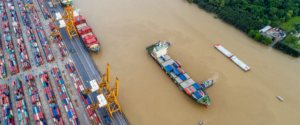People, Planet and P&Ls: The next generation of water PPPs
It was widely agreed that no one is an island, and that for businesses and societies to thrive across the globe, collaborative stewardship of our shared water is imperative. The next generation of water practices that safeguards people, planet and the P&L sheet will be born from collaboration between the private sector, NGOs, governments and civil society.
Earlier this month, I was in London for the first Financial Times Water Summit. It was clear from discussions that in order for businesses and societies to thrive, collaborative, innovative yet practical stewardship of our shared water resources is needed. And that cross-sector partnerships are a part of the solution.
Practical solutions that can be understood by all parties involved and articulated across disciplines, levels and sectors are needed. A tall order? Perhaps. But as interconnected climate, social and business risks accelerate, do we really have a choice? Comfort zones don’t breed change.
There was no shortage of understanding of the issues and critical analysis among speakers and participants. There was also wide consensus that cross-sector partnerships were the way forward. Not just any partnerships however. “Partnerships that are concrete and deliver measureable results for business, communities and environment are needed” was a clear message from SAB Miller. This only reinforced what we at SIWI have seen in the past few years – a surge in awareness and interest in water issues from the private sector.
Initiated in the 1990s, the concept of public-private-partnerships (PPPs) is not a new one, however it is still relatively new for many. Several PPPs for the post-2015 agenda are still in the development and early implementation phase.
Arguably, these next-generation collaborations could require a new term – PPPPs (Public-Private-People-Partnerships), to reflect the importance of including civil society in the achievement of a stable shared future. Acronyms are plentiful and confusing however, and are an indication of the different operational languages among sectors. Finding or creating a shared language will be part of the journey.
This is a familiar challenge. For the past two years, SIWI has developed, and started implementing the Sweden Textile Water Initiative in collaboration with Swedish leather and textile brands and their factory suppliers at several levels in the value chain. A true multi-stakeholder initiative, and finding a new operational language between brand-supplier-institute was a necessary step.
The pilot project of the initiative, Sustainable Water Resources (SWAR) was recently awarded the first Swedish fashion industry prize in sustainability at The Habit Fashion Awards (in Swedish). Among its many strengths and victories, SWAR brought together factories from the middle and lower end of the supply chain with brands, and together, saved 7 per cent of their total annual water use (360 million litres) and over 400 tonnes of chemicals.
Underpinning this success was the desire by all parties to learn together. Brands didn’t score suppliers and then leave them alone to sort out the problems themselves. Instead, they embarked on a journey with competitors and factories to identify non-compliance risks and find solutions using the Sweden Textile Water Initiative Guidelines.
This is evidence that the private sector has the potential to be more than just a source of funding. As partners with expertise and knowledge to share, we in other sectors can also learn a great deal from them. At the same time, the private sector must also acknowledge its limitations in regards policy, scientific and socio-political issues. That’s why we must work together, openly and honestly, to find the gaps, and develop innovative solutions that we can all implement. Only together can we achieve the social and economic change needed to meet the immense development challenges of the next generation. The private sector can help us to achieve that at a faster pace, and let’s be honest, we have very little time to spare.
Speakers at the FT Summit included Cate Lamb (CDP), Greg Koch (Coca-Cola), Gary White (Water.org), Michael Alexander (Diageo), Benedito Braga (State of Sao Paulo & World Water Council), Claude Nahon (EDF) and Anthony Cox (OECD).






